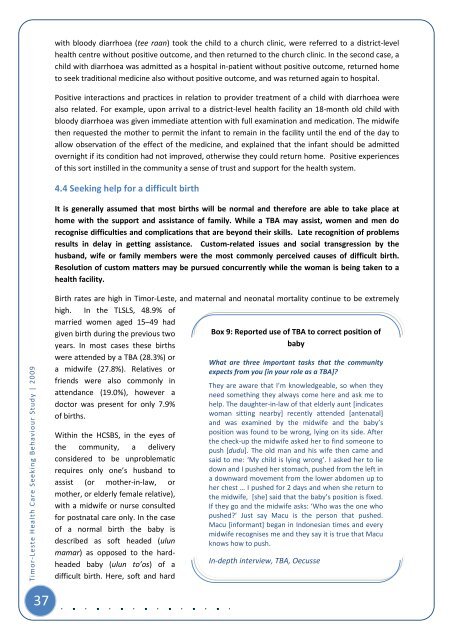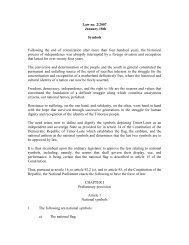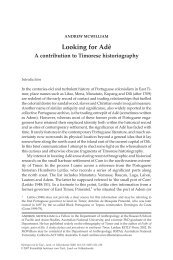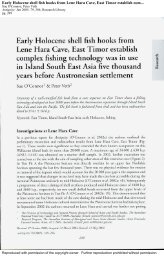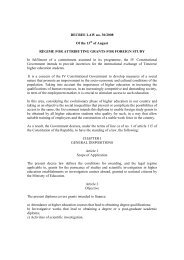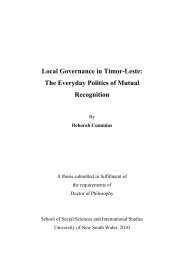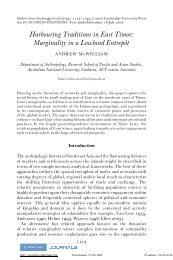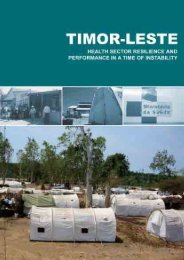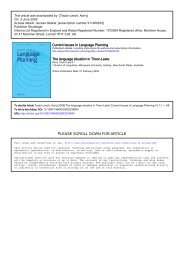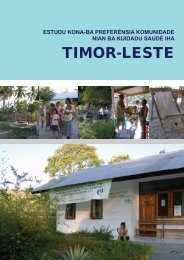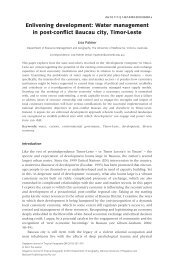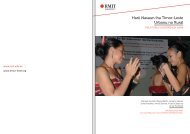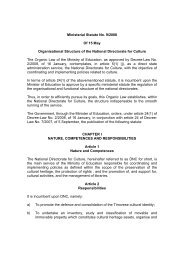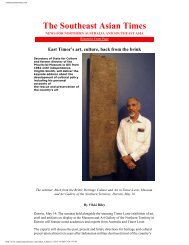Timor-Leste Health Care Seeking Behaviour Study - Secretaria de ...
Timor-Leste Health Care Seeking Behaviour Study - Secretaria de ...
Timor-Leste Health Care Seeking Behaviour Study - Secretaria de ...
- No tags were found...
Create successful ePaper yourself
Turn your PDF publications into a flip-book with our unique Google optimized e-Paper software.
with bloody diarrhoea (tee raan) took the child to a church clinic, were referred to a district-levelhealth centre without positive outcome, and then returned to the church clinic. In the second case, achild with diarrhoea was admitted as a hospital in-patient without positive outcome, returned hometo seek traditional medicine also without positive outcome, and was returned again to hospital.Positive interactions and practices in relation to provi<strong>de</strong>r treatment of a child with diarrhoea werealso related. For example, upon arrival to a district-level health facility an 18-month old child withbloody diarrhoea was given immediate attention with full examination and medication. The midwifethen requested the mother to permit the infant to remain in the facility until the end of the day toallow observation of the effect of the medicine, and explained that the infant should be admittedovernight if its condition had not improved, otherwise they could return home. Positive experiencesof this sort instilled in the community a sense of trust and support for the health system.4.4 <strong>Seeking</strong> help for a difficult birthIt is generally assumed that most births will be normal and therefore are able to take place athome with the support and assistance of family. While a TBA may assist, women and men dorecognise difficulties and complications that are beyond their skills. Late recognition of problemsresults in <strong>de</strong>lay in getting assistance. Custom-related issues and social transgression by thehusband, wife or family members were the most commonly perceived causes of difficult birth.Resolution of custom matters may be pursued concurrently while the woman is being taken to ahealth facility.<strong>Timor</strong>-<strong>Leste</strong> <strong>Health</strong> <strong>Care</strong> <strong>Seeking</strong> <strong>Behaviour</strong> <strong>Study</strong> | 2009Birth rates are high in <strong>Timor</strong>-<strong>Leste</strong>, and maternal and neonatal mortality continue to be extremelyhigh. In the TLSLS, 48.9% ofmarried women aged 15–49 hadgiven birth during the previous twoyears. In most cases these birthswere atten<strong>de</strong>d by a TBA (28.3%) ora midwife (27.8%). Relatives orfriends were also commonly inattendance (19.0%), however adoctor was present for only 7.9%of births.Within the HCSBS, in the eyes ofthe community, a <strong>de</strong>liveryconsi<strong>de</strong>red to be unproblematicrequires only one’s husband toassist (or mother-in-law, ormother, or el<strong>de</strong>rly female relative),with a midwife or nurse consultedfor postnatal care only. In the caseof a normal birth the baby is<strong>de</strong>scribed as soft hea<strong>de</strong>d (ulunmamar) as opposed to the hardhea<strong>de</strong>dbaby (ulun to’os) of adifficult birth. Here, soft and hardBox 9: Reported use of TBA to correct position ofbabyWhat are three important tasks that the communityexpects from you [in your role as a TBA]?They are aware that I’m knowledgeable, so when theyneed something they always come here and ask me tohelp. The daughter-in-law of that el<strong>de</strong>rly aunt [indicateswoman sitting nearby] recently atten<strong>de</strong>d [antenatal]and was examined by the midwife and the baby’sposition was found to be wrong, lying on its si<strong>de</strong>. Afterthe check-up the midwife asked her to find someone topush [dudu]. The old man and his wife then came andsaid to me: ‘My child is lying wrong’. I asked her to liedown and I pushed her stomach, pushed from the left ina downward movement from the lower abdomen up toher chest … I pushed for 2 days and when she return tothe midwife, [she] said that the baby’s position is fixed.If they go and the midwife asks: ‘Who was the one whopushed?’ Just say Macu is the person that pushed.Macu [informant] began in Indonesian times and everymidwife recognises me and they say it is true that Macuknows how to push.In-<strong>de</strong>pth interview, TBA, Oecusse37


